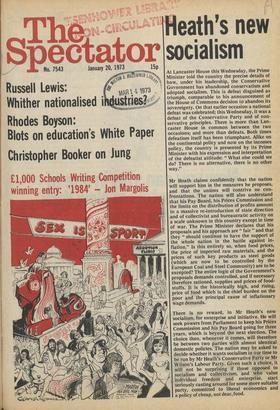Heath's new socialism
At Lancaster House this Wednesday, the Prime Minister told the country the precise details of how, under his leadership, the Conservative Government has abandoned conservatism and adopted socialism. This is defeat disguised as triumph, comparable to his announcement of the House of Commons decision to abandon its sovereignty. On that earlier occasion a national defeat was celebrated; this Wednesday, it was a defeat of the Conservative Party and of conservative principles. There is more than Lancaster House in common between the two occasions; and more than defeats. Both times defeatism itself has been triumphant. Alike on the continental policy and now on the incomes policy, the country is presented by its Prime Minister with his expression and interpretation of the defeatist attitude: "What else could we do? There is no alternative, there is no other way."
Mr Heath claims confidently that the nation will support him in the measures he proposes, and that the unions will contrive no con frontations. The nation will also understand that his Pay Board, his Prices Commission and the limits on the distribution of profits amount to a massive re-introduction of state direction and of collectivist and bureaucratic activity on a scale unknown in this country except in time of war. The Prime Minister declares that his proposals and his approach are" fair "and that they "should continue to have the support of the whole nation in the battle against inflation." Is this entirely so, when food prices, the price of imported raw materials, and the prices of such key products as steel goods (which are now to be controlled by the European Coal and Steel Community) are to be excepted? The entire logic of the Government's proposals demands controlled, and if necessary therefore rationed, supplies and prices of foodstuffs. It is the historically high, and rising, price of food which is the chief burden on the poor and the principal cause of inflationary wage demands.
There is no reward, in Mr Heath's new socialism, for enterprise and initiative. He will seek powers from Parliament to keep his Prices Commission and his Pay Board going for three years, which is beyond the next election. The choice then, whenever it comes, will therefore be between two parties with almost identical domestic policies. The nation may be asked to decide whether it wants socialism in our time to be run by Mr Heath's Conservative Party or Mr Wilson's Labour Party. Given such a choice, it will not be surprising if those opposed to socialism and collectivism, and who value individual freedom and enterprise, start seriously casting around for some more suitable party, committed to liberal economics and a policy of cheap, not dear, food.


































